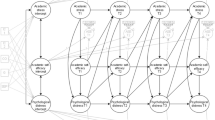Abstract
The purposes of this study are as follows: (1) to determine whether burnout among elementary school teachers in Korea differs on selected demographic variables, (2) to investigate the relationship between burnout and negative mood regulation expectancies, as an internal variable, and social support, as an external variable, and (3) to examine the relative effects of these two variables on burnout. As regards burnout differences according to grades under their charge, upper-grade teachers reported experiencing a greater degree of burnout than lower-grade teachers. In particular, a significant difference was found in depersonalization. With respect to the relationships among burnout, social support, and negative mood regulation expectancies, perceived social support in general was associated with a lowered degree of burnout, while negative mood regulation expectancies correlated negatively with burnout. Furthermore, negative mood regulation expectancies, as an internal variable, affected burnout more than social support, as an external variable. This finding suggests that burnout can be alleviated by controlling negative mood regulation expectancies, and therefore, intervention efforts, such as counseling, continuing education, or training programs designed to enhance teachers’ negative mood regulation expectancies, could benefit teachers in reducing their burnout.
Similar content being viewed by others
References
Aldwin, C. M. (1994). Stress, coping and development: An integrative perspective. NY: Guilford.
Beehr, T. A. (1985). The role of social support in coping with organization stress. In T. A. Beehr & R. S. Bhagat (Eds.), Human stress and cognition in organization (pp. 375–400). NY: Wiley.
Betroret, F. D. (2006). Stressors, self-efficacy, coping resources, and burnout among secondary school teachers in Spain. Educational Psychology, 26(4), 519–539.
Borg, M. G. (1990). Occupational stress in British educational settings: A review. Educational Psychology, 10, 103–126.
Brown, C., & O’Brien, K. M. (1998). Understanding stress and burnout in shelter workers. Professional Psychology: Research & Practice, 29, 383–385.
Caplan, R. D., Cobb, S., French, J. R. P., Van Harrison, R., & Pinneau, S. P. (1980). Job demands and worker health. Ann Arbor, MI: Institute for Social Research.
Catanzaro, S. J. (1994). Mood regulation expectancies, anxiety sensitivity, and emotional distress. Journal of Abnormal Psychology, 102, 327–330.
Catanzaro, S., & Laurent, J. (2004). Perceived family support, negative mood regulation expectancies, coping, and adolescent alcohol use. Addictive Behaviors, 29, 1779–1797.
Catanzaro, S. J., & Mearns, J. (1990). Measuring generalized expectancies for negative mood regulation: Initial scale development and implications. Journal of Personality Assessment, 54, 546–563.
Chan, D. W. (2007). Burnout, self-efficacy, and successful intelligence among Chinese prospective and in-service school teachers in Hong Kong. Educational Psychology, 27, 33–49.
Cohen, S., & Wills, T. A. (1983). Stress, social support, and buffering hypothesis. Psychological Bulletin, 98, 310–357.
Corey, G. (1998). Theory and practice of counseling and psychotherapy, 4/e. Asia: International Thomson Publishing.
Delia, C., & Patrick, T. (1996). Stress in clinical psychologists. The International Journal of Social Psychiatry, 42, 141–149.
Farber, B. A. (2000). Treatment strategies for different types of teacher burnout. Psychotherapy in Practice, 56(5), 675–689.
Kim, D. C. (1995). A study on the principal’s leadership and teacher’s burnout. Unpublished Master’s thesis, Chonnam National University (in Korean language).
Kim, M. K. (1998). The effect of emotion awareness, clarity of emotion recognition, negative mood regulation expectancies on help seeking behavior. Unpublished Master’s thesis, Yonsei University (in Korean language).
Kim, J. H. (2001). Self care of counselors. 11th counselor practicum. Association of Korean Counseling and Psychotherapy (in Korean language).
Kim, H. S. (2004). The relationship between self-efficacy and burnout among vocational high school teachers in Korea. An unpublished Master’ thesis. A Graduate School of Education, Dankook University (in Korean language).
Lee, H. G., & Lee, S. J. (1997). The research on the validation of trait meta-mood scale: Domain exploration of the emotional intelligence. Korean Journal of Personality and Social Psychology, 11(1), 95–116. (in Korean language).
Maslach, C. (1982). Understanding burnout. In W. S. Pine (Ed.), Job stress and burnout. NY: Sage Publication, Inc.
Maslach, C., & Jackson, S. (1981). Maslach Burnout Inventory manual. Palo Alto, CA: Consulting Psychologists Press.
Mearns, J., & Cain, J. (2003). Relationships between teachers’ occupational stress and their burnout and distress. Anxiety, Stress and Coping, 16(1), 71–82.
Park, J. W. (1985). A study of social support scale development. Unpublished doctoral dissertation, Yonsei University (in Korean language).
Park, S. H. (2001). Influence of occupational stress and social support on counselor burnout. Unpublished master’s thesis, Ewha Women’s University (in Korean language).
Pines, A. M., Aronson, E., & Kafry, D. (1981). Burnout from tedium to personal growth. New York: A Division of MecMillien Publishing Co. Inc.
Raquepaw, J. M., & Miller, R. S. (1989). Psychotherapist burnout: A componential analysis. Professional Psychology: Research & Practice, 20, 32–36.
Ray, E. B., & Miller, K. I. (1994). Social support, home/work stress, and burnout; Who can help? Journal of Applied Behavioral Science, 30, 357–373.
Schwab, R. L., Jackson, S. E., & Schuler, R. S. (1986). Educator burnout: Sources and consequences. Educational Research Quarterly, 10, 14–30.
Schaefer, C., Coyne, J. C., & Lazarus, R. S. (1981). The health-related functions of social support. Journal of Behavioral Medicine, 4, 381–406.
Vitaliano, P. P., DeWolfe, D. J., Maiuro, R. D., Russo, J., & Katon, W. (1990). Appraised changeability of a stressor as a modifier of the relationship between coping and depression: A test of the hypothesis of fit. Journal of Personality and Social Psychology, 59(3), 582–592.
Yoo, J. E. (2002). Influence of occupational stress and perceived social support on elementary school teachers burnout in Korea. The Journal of Elementary Education, 15(2), 315–328. (in Korean language).
Author information
Authors and Affiliations
Corresponding author
Rights and permissions
About this article
Cite this article
Kim, M.Y., Lee, J.Y. & Kim, J. Relationships among burnout, social support, and negative mood regulation expectancies of elementary school teachers in Korea. Asia Pacific Educ. Rev. 10, 475–482 (2009). https://doi.org/10.1007/s12564-009-9045-9
Received:
Revised:
Accepted:
Published:
Issue Date:
DOI: https://doi.org/10.1007/s12564-009-9045-9




